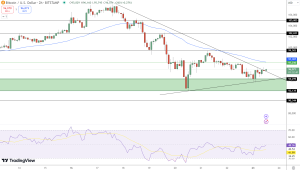Last updated:
 Why Trust Cryptonews
Why Trust Cryptonews
Ad Disclosure
We believe in full transparency with our readers. Some of our content includes affiliate links, and we may earn a commission through these partnerships.

Botswana’s central bank has called for crypto regulations to mitigate future risks, even though the local cryptocurrency market remains relatively underdeveloped and poses “minimal” risks to financial stability at present.
In its latest Financial Stability Report, the Bank of Botswana acknowledged the increasing interconnectedness between the crypto market and traditional financial systems globally, warning of potential systemic risks.
Systemic risks refer to the cascading failures that can occur within the financial system, potentially triggering broader economic instability.
Botswana Calls for Crypto Regulations
The central bank of Botswana said regulators “need to develop effective oversight frameworks for the sector.”
“Domestically, risks emanating from crypto assets are minimal but ongoing misconduct in the segment presents regulatory concerns.”
While the bank noted that Botswana’s virtual asset market is still in its infancy and relatively unsophisticated, posing limited threats to financial stability, it also identified broader concerns tied to financial technology innovations.
As tech adoption grows, these risks are expected to increase, requiring proactive measures.
A key concern raised by the bank is the use of digital payment instruments, including cryptocurrencies, for money laundering and terrorist financing.
It identified the anonymity provided by digital platforms as a significant factor enabling illicit activities and flagged this issue as one of the top five national security risks emanating from the financial sector.
“The evolution of digital platforms and digital payment instruments that promote anonymity of transactions present an opportunity for money laundering in the financial sector,” the bank stated, adding that advanced financial technologies make it easier to transmit illicit funds.
To address these challenges, the Bank of Botswana called for regulatory oversight to ensure that virtual asset service providers, such as crypto exchanges, comply with Anti-Money Laundering (AML) and Counter Financing of Terrorism (CFT) regulations.
The bank also recommended enhanced market surveillance and collaboration with law enforcement as strategies to detect and prevent illegal activities.
More Countries Push for Crypto Regulations
Botswana’s call for crypto regulations comes as more countries are announcing new rules for crypto companies.
Just recently, Taiwan announced that it is set to implement its new AML regulations for crypto businesses following fines issued to two exchanges for compliance breaches.
The Financial Supervisory Commission (FSC) announced in November that the deadline for mandatory AML registration for virtual asset service providers (VASPs) has been moved up to November 30, 2024, from the previous January 1, 2025, timeline.
Likewise, the United Kingdom plans to introduce a comprehensive regulatory framework for the cryptocurrency sector early next year.
During a London conference last month, Economic Secretary to the Treasury Tulip Siddiq said that the proposed framework will consolidate regulations for stablecoins and staking services under one unified regime.
Meanwhile, cryptocurrency enforcement in the United States may ease under the upcoming administration of Republican President-elect Donald Trump, with regulatory priorities expected to shift.















